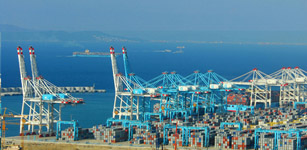 What effect does privatisation have on employment and inequality? Over the last few years, developed and developing countries alike have carried out mass privatisation without being truly aware of its effect on the working population. In December 2010, FEMISE conducted a study (FEM33-08) with a view to filling in the blanks on the subject.
What effect does privatisation have on employment and inequality? Over the last few years, developed and developing countries alike have carried out mass privatisation without being truly aware of its effect on the working population. In December 2010, FEMISE conducted a study (FEM33-08) with a view to filling in the blanks on the subject.
Nearly everything is being sold off, whether it is ports (Photo APMT of Tangier port, operating with private operators), airports, roads, coal mines or shipping companies. But does this privatisation help to reduce poverty, inequality and unemployment?
Not necessarily. It all depends on how governments use the money they make from selling off parts of the production system. In other words, inequality and employment levels depend on how corrupt a particular country is.
It has been proven that the proceeds of privatisation in Africa and Latin America have had a negative impact on inequality, and the same can be said of the Mediterranean countries.
Corruption and embezzlement in Tunisia and Egypt have served only to widen the chasm of inequality, driving populations to overturn years of authoritarian rule. This is the conclusion of the study entitled “The economic and social impact of state divestiture: A comparison between MENA countries and other region”, published by FEMISE (FEM33-08 ) in May 2011.
The need to eradicate corruption
The report highlights the need to “eradicate corruption”, stressing that the proceeds of privatisation can reduce inequality as long as the “institutional conditions are favourable and “the level of inequality is as low as in Europe or Asia”.
This new research examines the macro- and microeconomic effects of state divestiture and its impact on the stock markets, and it also compares privatisation on several continents.
Coordinated by Adel Boughrara from the University of Sousse, the research involved five FEMISE economists from both sides of the Mediterranean in December 2010. It was the first study of its kind. “As surprising as it may seem, the potential impact of privatisation on employment and inequality has regrettably been ignored,” write the authors, who agree that an increase in state divestiture, with the exception of Europe, leads to a significant reduction in unemployment levels, at least in the first year following privatisation.
However, the method of privatisation determines the effect on employment levels.
According to the economists, privatisation by way of a public tender is “not the right method to follow” because it is counterproductive for employment levels. The buyer of a national enterprise will set about cutting jobs, using more machines and technology and implementing new work practices.
The study suggests that these departures should be mitigated by introducing supporting measures with the creation of special provisions to indemnify employees that have been sidelined (helping them to find another job, compensation, early retirement, etc.).
Download the FEMISE report FEM 33-08
Article by Nathalie Bureau du Colombier, Econostrum. More articles of the “Grand Angle” can be found at the following address:www.econostrum.info. Registration for the Econostrum newsletter is available here:http://www.econostrum.info/subscription/


